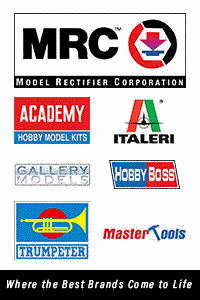
Trumpeter 1/32 F6F-3 Hellcat Kit First Look
By Michael Benolkin
| Date of Review | April 2008 | Manufacturer | Trumpeter |
|---|---|---|---|
| Subject | Grumman F6F-3 Hellcat | Scale | 1/32 |
| Kit Number | 2256 | Primary Media | Styrene, Photo-Etch |
| Pros | Nice details and options, tow tractor, easier build | Cons | |
| Skill Level | Intermediate | MSRP (USD) | $89.95 |
First Look
 |
 |
 |
 |
 |
 |
 |
 |
 |
 |
The Grumman F6F Hellcat was designed as another step in the incremental designs that were being applied to Grumman's carrier-based fighter designs. While design work for the Hellcat started in mid-1941, well before Pearl Harbor, and the initial variants were supposed to be powered with the 1,700 horsepower Wright R2600 Cyclone engine, but after assessing the combat experiences of the F4F against the Zero, the engine was changed to the Pratt & Whitney R2800 rated at 2,000 horsepower.
The Hellcats were armed with six 50 caliber machine guns, just like many of the Wildcats, but the Hellcat had the armor and firepower to prevail in aerial combat. In fact, it was the highest scoring US Navy fighter in World War 2 with well over 5,000 kills.
The F6F-5 differed little from the F6F-3 though the side windows aft of the cockpit were deleted while receiving a two-stage supercharger for improved performance.
Here's the latest installment from Trumpeter from the F6F Hellcat series, this being the first operational version - the F6F-3. If you're peeking ahead at the plastic, you might think "that isn't an F6F-3" when looking at the fuselage. If you flip the fuselage over, you'll see that Trumpeter molded in a cut-out for the F6F-3's aft cockpit windows:
The kit is molded in light gray styrene and presented on seven parts trees, plus two trees of clear parts and a separate clear cowling. The cowl flaps are also clear and are located on one of the two clear trees. A tiny fret of photo-etch is included in this release, which means that the model can be build a little easier by less-experienced modelers. The two photo-etched parts that are included are simply the pilot's shoulder harnesss (though no lap belts are provided).
One additional gray styrene tree is included in this kit containing the parts for a tow tractor and tow bar that is very nicely detailed and will look great hooked up to your 'cat or parked next to it.
The surface detail features finely scribed panel lines and lots of rivet detail. While these scribed rivet holes are not good on a bare metal subject like the F-100, you will hardly see them under a coat of dark blue.
The kit has a really nicely detailed cockpit. This area offers some nice detailing that can only be improved with perhaps some color photo-etched panels, control heads, and safety placards, as well as a complete set of seat belts and shoulder harness. The canopy can be positioned open or closed.
The area from the firewall forward is yet another Trumpeter work of art with LOTS of details provided on the firewall includning oil tank, engine mounts and that R2800. The engine is a complete model of its own right and to make the effort of assembling, painting and weathering of this engine worthwhile, Trumpeter provides the cowling as a clear part so you can see some or all of the engine 'under the hood'. Two sets of clear cowl flaps are provided - open and closed.
Under the category of over-engineering, the kit does provide avionics pallets with radio 'black boxes' that reside behind the cockpit. There are no windows, access panels or any other way of seeing these details after assembly. You might consider skipping those steps.
The gun bays are nicely laid out with the six .50 caliber machine guns, ammo feeds, and ammo troughs. The gun bay doors are provided separately and the gun bay doors can be displayed closed or removed.
The flight control surfaces are molded separately so you can position the flaps, ailerons, elevators, and rudder as you wish. No photo-etched hinges are used in the construction of this model.
External store options on the kit include underwing rockets, inboard bomb racks with bombs, and a centerline drop tank.
One of the other nice features of this kit is the separate flight control surfaces. The ailerons, rudder, elevators, and trailing edge flaps are all separate parts that can be positioned however you like. The best part is that you can cement them into place and they'll stay there - no photo-etched hinges to contend with!
The wings can be positioned in flight position or folded aft. This is quite an advantage when parking 1/32 aircraft on your shelf! The landing gear is designed to be down only.
Last, but definitely not least, is that really nice deck tow tractor with tow bar to spot the aircraft anywhere on the deck.
Markings are provided for two aircraft:
- F6F-3, CAG CVG-15 USS Essex, 'Minsi', Oct 1944, as flown by Cdr, David McCampbell
- F6F-3, 19, VF-6, USS Intrepid, Feb 1944, as flown by Lt.Cdr. Alex Vraciu
The color profiles in the kit use Gunze Sangyo color numbers. The decals also include a set of maintenance stencils. You can see our color tables for this kit here.
This is another interesting release from Trumpeter. The details are great, the options are nice, there is only a minimum of photo-etch and over-engineering in the design, so this should be a straightforward build. There is also a tow tractor provided in this box. With the wings folded, this is a great way to model in 1/32 without taking up large amounts of shelf space and will look great with the Trumpeter 1/32 F4U, F4F-4, and TBF/TBM.
My sincere thanks to Stevens International for this review sample!








